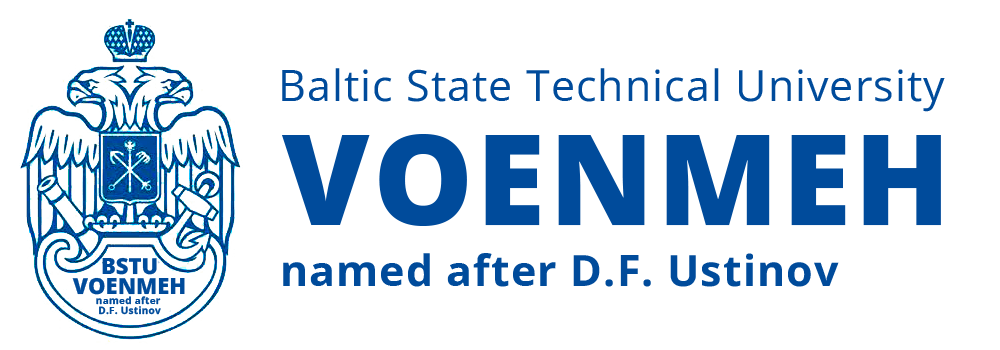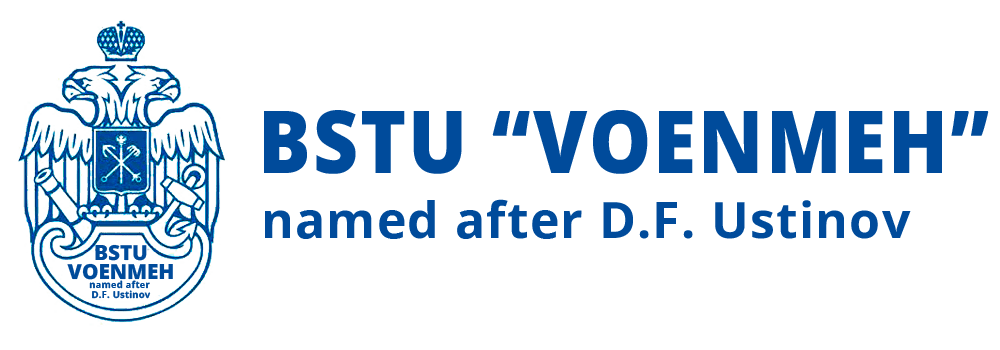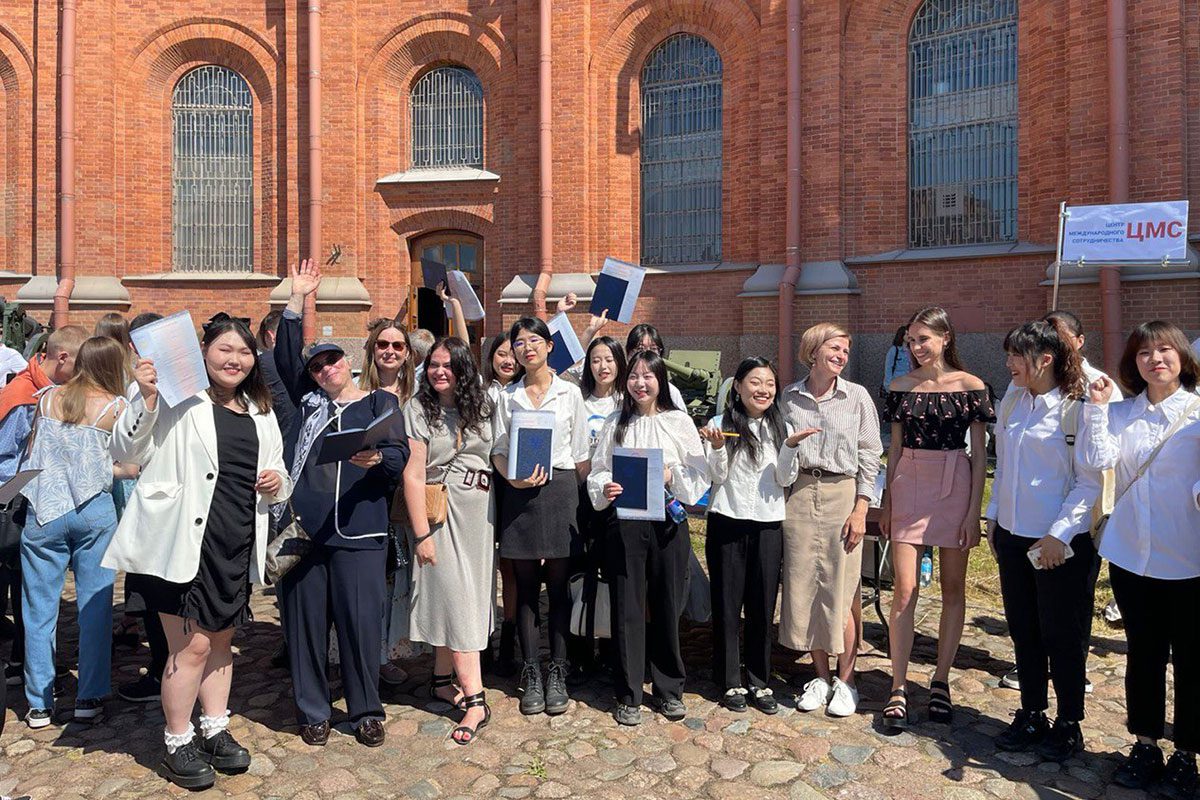
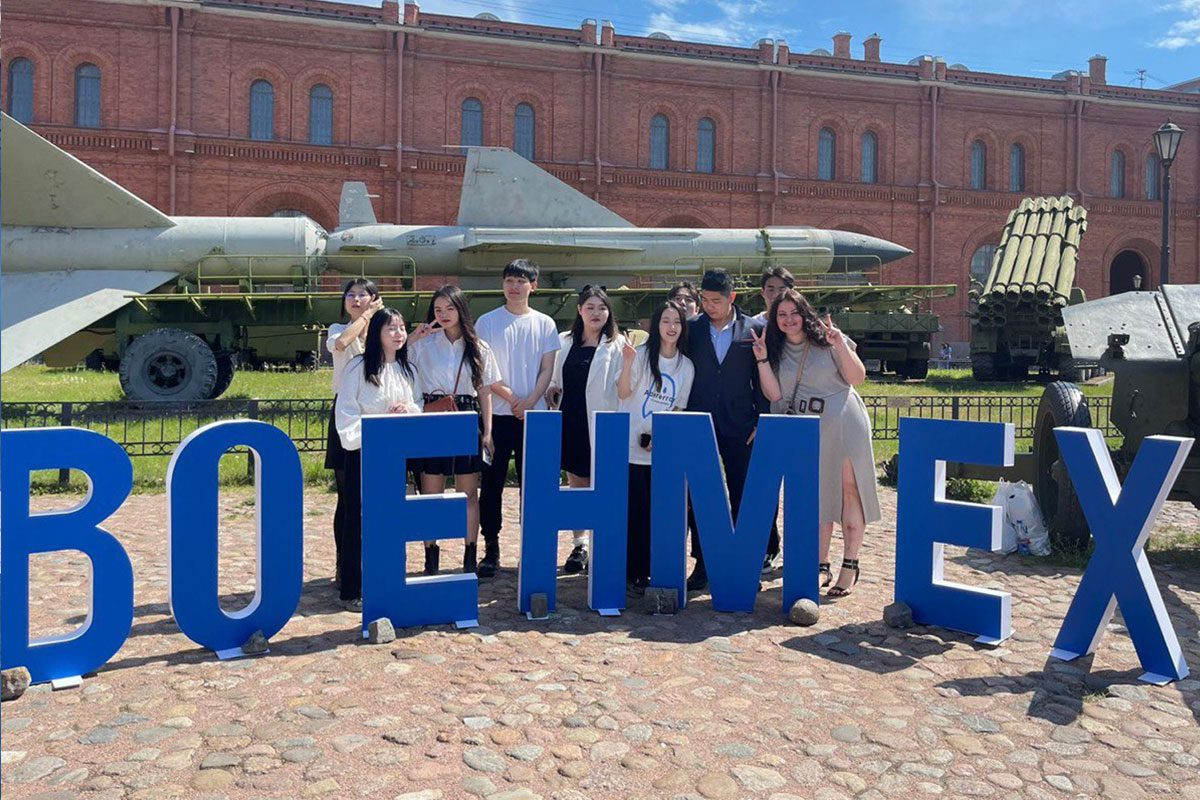
Admission Rules and Policies for Foreign Students to Enroll in BSTU “VOENMEH” named after D.F. Ustinov
Necessary documents to enroll in the University:
- The original documents on education or on education and on qualification (degree) with a full list of subjects studied and grades obtained on them
- Notarized translation into Russian of educational documents and grades in the subjects studied (or certified by the Embassy or Consulate of the Russian Federation in the country where the educational documents were issued)
- The copies of documents certifying the identity and citizenship of the applicant (the first two pages of the passport / ID)
- Notarized translation into Russian of the first two pages of the passport / ID
A list of documents required for admission (one of them):
1. Documents verifying the identity of a foreign citizen in the territory of the Russian Federation (and their copies as well):
- A passport of a foreign citizen;
- A diplomatic passport;
- Passport of the USSR citizen of the 1974 sample (for special categories);
- Document issued by a foreign state and recognized in accordance with an international treaty of the Russian Federation as an identity document of a stateless person;
- Other document determined by the Federal Law or recognized in accordance with an international treaty of the Russian Federation as an identity document of a foreign citizen or stateless person;
- A temporary residence permit;
- A residence permit;
- A refugee certificate or a document confirming a consideration of an application for recognition of a refugee status in the Russian Federation;
2. An academic certificate and its copy (and its notarized translation if it is in a foreign language).
3. If there is an intention to take general educational entrance examinations conducted by the organization of higher education independently (under bachelor’s and specialist’s programs), a document confirming disability;
4. Documents or any other evidence confirming belonging to compatriots (if necessary) according to point 6 of Article 17 of the Federal Law № 99.
5. Documents confirming individual achievements of an applicant, which are taken into account in the process of admission (to be submitted at the discretion of the applicant).
Peculiarities of foreign citizens admission:
1. Foreign citizens who enter university on the basis of international agreements shall submit in addition to the documents specified in clause 46 of the Admission Order (stated above – A list of documents required for admission), documents confirming their affiliation with the number of persons specified in the relevant international agreements.
2. Foreign citizens and stateless persons who are compatriots living abroad (hereinafter – compatriots) should submit besides the documents mentioned in clause 46 of the Admission Order, original or copies of the documents specified in Article 17 of the Federal Law № 99 «On the State Policy of the Russian Federation in regard to Compatriots Living Abroad” dated May 24, 1999.
Compatriots do not have special rights when enrolling in Bachelor’s and Specialist’s degree programs provided in accordance with Federal Law N 273, unless otherwise provided for by an international treaty of the Russian Federation.
3.Foreign citizens and stateless persons are admitted to studying according to the results of entrance examinations specified in paragraphs 15 – 17 of the Admission Order (either based on Unified State Exam or Entrance Examinations)
4. When submitting documents, a foreign citizen or stateless person presents in accordance with subparagraph 1 of the Admission Order paragraph 46 the original or copy of an identity document, citizenship, or identity document of a foreign citizen in the Russian Federation or a stateless person in the Russian Federation in accordance with Article 10 of Federal Law of 25 July 2002 N 115 “On the legal status of foreign citizens in the Russian Federation”.
Admission policies
Step 1
- Learn information about the admission process
- Choose the fields of study available for foreign nationals
- Prepare documents required for admission:
- Originals or copies of educational certificates or education and qualification (degree) documents with a complete list of the subjects studied and grades;
- A notarized Russian translation of educational certificates and corresponding grades in studied subjects;
- Copies of documents proving the identity and citizenship of an applicant (first two pages of a passport or an ID);
- A notarized Russian translation of the first two pages of a passport/ an ID.
Russian translation of educational documents made outside of the Russian Federation must be certified by a notary or, alternatively, certified by the Russian Embassy or Consulate in the country where the educational documents were issued.
In case foreign statе education or education and qualification documents are submitted, one should also submit the original or a copy of the foreign education recognition certificate issued by the Federal Education and Science Supervision Agency Federal government institution “Main State Expert Center for Educational Assessment” (“Glavekspertcenter”) or a personal statement of an applicant on recognition of education obtained by him/her as education of the appropriate level, which allows him/her to be admitted to educational programs. Documents received in a foreign state must be legalized, unless otherwise provided by an international treaty of the Russian Federation or the legislation of the Russian Federation.
Step 2
- Submit your documents
- Register in the Personal Account of an applicant, or come to the Admissions Office at the address: St.Petersburg, 1-st Krasnoarmeyskaya St., 13Б.
- https://lk.priem.voenmeh.ru/
Step 3
- Choose the date and time for the admission test
- When registering in the Personal Account of an applicant, choose the date and time of the entrance examinations conducted by the organization itself (dates will be available in June).
Step 4
- Take entrance examinations
- On the appointed day and time you pass the entrance exam, conducted by the organization on its own in the form of testing in electronic information educational environment BSTU “VOENMEH” named after D. F. Ustinov remotely, or in person at the University.
- https://exam.voenmeh.ru/
Step 5
- Keep track of information
- Follow the information on the website about the progress of the admission campaign and the issuance of orders for admission. Admission to the state-funded places is carried out according to the lists of applicants for the allocated places in the presence of the original document of education.
The application for admission shall be submitted in Russian, documents written in foreign languages shall be submitted with a translation into Russian, certified in the prescribed manner.
In case you are enrolling as a fee-paying student
- Make a fee-paid education contract in your Personal Account
- Pay tuition fee according to the contract
- Tuition fees (https://priem.voenmeh.ru/stoimost-obucheniya)
Information about Entrance Examinations (Examination Schedule, Regulation, Instructions) (https://priem.voenmeh.ru/inf-o-vi)
| All Modes of Study | |||||||
|---|---|---|---|---|---|---|---|
| Stages of Enrollment | Completion of receiving documents | Completion of entrance examinations | Completion of receiving the originals of documents (mark on submitting the originals of documents on the Public Services Portal of the Russian Federation) | ||||
| Category | B/S (EE) | B/S (USE) | М | B/S | М | B/S | М |
| The Main Stage of Enrollment | 20th of July | 25th of July | 27 of July | 25th of July | 28th of July | 3rd of August | 31st of July |
| The Stage of Prioritized Enrollment | 20th of July | 25th of July | 27 of July | 25th of July | 28th of July | 28th of July | 31st of July |
| On the basis of fee-paid education contract | 18th of August | 20th of August | 26th of August | 21st of August | 27th of August | 23rd of August | 28th of August |
The List of notations
- БС – applicants entering Bachelor and Specialist degree programs
- БСпоВВИ – applicants entering Bachelor and Specialist degree programs based on the results of internal entrance examinations
- БСпоЕГЭ (USE) – applicants entering Bachelor and Specialist degree programs based on the results of internal entrance examinations based only on the results of Unified State Exam
- М – applicants entering Master degree programs
Legalization of academic certificates
Education certificates submitted to BSTU «VOENMEH» have to be legalized. All application documents (passport +certificates) have to be translated into Russian and be notarized. Legalization of documents is ONLY possible in the country of issue. Translations can be made both in your home country and Russia.
NB: It is essential that the spelling of your name is identical on all documents. To simplify the application procedure and avoid complications, we advise you to wait for an official invitation to Russia before you apply for a visa. After receiving an invitation, you can proceed to legalizing your school-leaving certificate or diploma (if applicable) and translating your application papers.
Studying in Russia requires legalization of your academic certificates. To use academic certificates issued in your country in Russia, you have to legalize them. For example, a certificate issued in Nigeria is valid only in Nigeria. To use it in Russia you need to legalize it.
There are two types of legalization: Stamp “Apostille” and Consular legalization. Choosing the type of legalization in each case depends on the country of destination. The country of your destination is Russia.
Apostille (stamp)
An apostille is valid in countries that have signed the Hague Convention. One Apostille is valid for all countries on the list. If your country is on the list, then you only need an apostille.
- Albania
- American Samoa
- Andorra
- Antigua and Barbuda
- Argentina
- Armenia
- Aruba
- Australia
- Austria
- Azerbaijan
- Bahamas
- Barbados
- Belarus
- Belgium
- Belize
- Bermuda
- Bosnia and Herzegovina
- Botswana
- British Virgin Islands
- Brunei
- Bulgaria
- Cape Verde
- Cayman islands
- China
- Colombia
- Colombia
- Costa Rica
- Croatia
- Cyprus
- Czech Republic
- Denmark
- Liberia
- Dominica
- Dominican Republic
- Ecuador
- Estonia
- Falkland Islands (Islas Malvinas)
- Fiji
- Finland
- France
- French Guiana
- French Polynesia
- Georgia
- Germany
- Gibraltar
- Greece
- Grenada
- Guadeloupe
- Guam
- Honduras
- Hungary
- Iceland
- India
- Ireland
- Isle Of Man
- Israel
- Italy
- Japan
- Jersey
- Kazakhstan
- Kyrgyzstan
- Latvia
- Lesotho
- Saint Helena Island
- Liechtenstein
- Lithuania
- Luxembourg
- Macedonia
- Malawi
- Malta
- Marshall Islands
- Mauritius
- Mayotte
- Mexico
- Moldova
- Monaco
- Mongolia
- Montenegro
- Namibia
- Netherlands
- Netherlands Antilles
- New Caledonia
- New Zealand
- Niue
- Northern Mariana Islands
- Norway
- Oman
- Panama
- Peru
- Poland
- Portugal
- Puerto Rico
- Reunion
- Romania
- Russia
- Saint Kitts and Nevis
- Saint Lucia
- Saint Vincent and the Grenadines
- Saint-Pierre and Miquelon
- Salvador
- Samoa
- San marino
- Sao Tome and Principe
- Serbia
- Seychelles
- Slovakia
- Slovenia
- South Africa
- Spain
- Suriname
- Swaziland
- Sweden
- Switzerland
- The Republic of Korea
- Tonga
- Trinidad and Tobago
- Turkey
- Turks and Caicos Islands
- Ukraine
- United Kingdom
- US Virgin Islands
- USA
- Uzbekistan
- Vanuatu
- Venezuela
- Wallis and Futuna
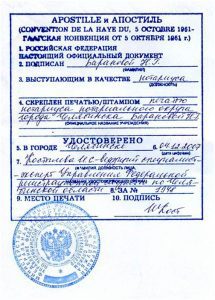
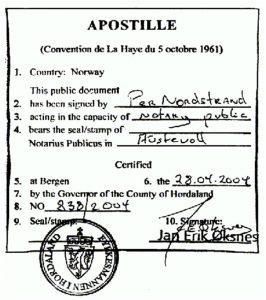 How does an apostille (stamp) look like?
How does an apostille (stamp) look like?
- It is a form of 10 points, which is filled by an employee of a state institution + Signature and seal. Title is required: Apostille (Convention de la Haye du 5 octobre 1961).
Consular legalization
- Each country has its own laws and procedures. Therefore, you have to present yourself with your documents at the Russian Embassy or Consulate and ask the officials what and in what order you need to do.
- Perhaps you need to notarize your documents in several organizations.
What does the consular legalization stamp look like?
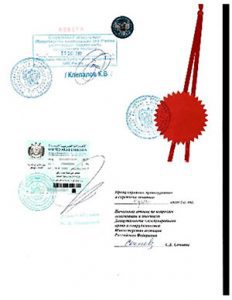
- It may be on the original document or translated, or copy.
- NB: Please note that this information is purely introductory. You need to contact the Consulate or Embassy of Russian Federation in your country and learn how to certify documents. Follow the instructions offered by Embassy or Consulate officials.
Legalization has to be done TWICE:
- Legalization of the documents obtained in your country to study in Russia
- Legalization of Russian diploma, so that it is valid in your country
Remember: You will also need a notarized translation of your document in the language of the country you are traveling to. In this case it is Russia.
More information: https://priem.voenmeh.ru/inostran











